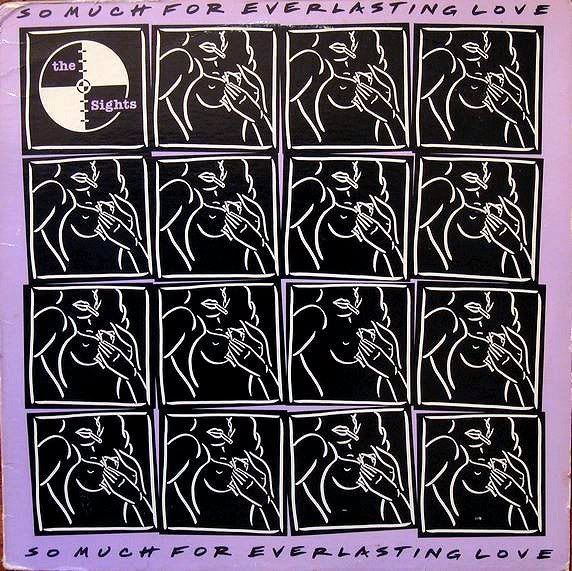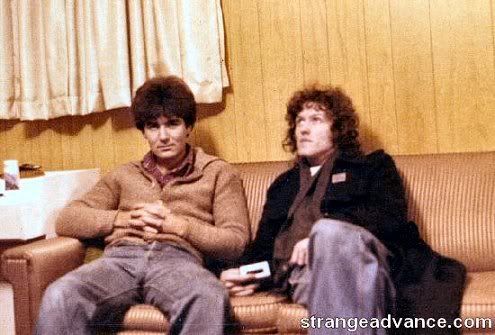Ever since I've been online, I've been looking for a reasoned argument in favor of my favorite musical artist. Having spent ten years with no fitting solutions to that riddle, I've taken it upon myself to posit said argument. This is the conclusion of my Statement Of Fan Being.In Britain, Duran Duran's debut album was received (generally) favorably, but as is the case with most musical artists that gain enormous amounts of popularity, the British music press turned on them by the time
Rio was released. However, the American music media establishment has never been fair to Duran Duran. Not even
Rolling Stone magazine, which put the band on its cover in January 1984, dared to go any further than a barely tolerant "we'll acknowledge you because you are a part of the zeitgeist, no more" attitude. By 1980, all corners of American pop cultural media were being controlled by the "peace and love" hippie children of the late '60s, individuals who were brought up to have very rigid ideas about who or what to respect in the worlds of entertainment. Detached guitar strumming and caterwauling about current affairs in some oblique manner was considered to be the acme of musical achievement. Dancing was out unless it was sloppy and accidental, mimicking some kind of drugged-out shimmy, and musical artists who showcased any sort of clean-cut, tailored style were definitely not taken seriously.
So when Duran Duran and their contemporaries came onto the scene and started attracting the attention of America's youth, these establishment figures sneered at their style and polish. It wasn't gritty enough, rock & roll enough, or masculine enough; its sound didn't properly rip off old and impoverished Missisippi bluesmen, and the lyrics? Well, geez, you actually had to ponder the meaning of the lyrics! Things weren't automatically spelled out for you! They were, dare I say it, less like a newspaper report and more like Shakespeare! The artists were advocating -- shock horror -- that the answer to living through an era when life was changing at a dizzying pace and mini-revolutions were happening on a near-daily basis was not to whine about things but rather to take charge, to revolt! Duran Duran came from a dark, dreary industrial city in an area commonly known as the "Black Country". Most of the band spent years doing manual labor while waiting for their big break. While touring the U.K. in 1980 in support of punk diva Hazel O'Connor, a tour that they hoped would attract the attention of record labels, the band lived out of their touring van, had a ten pound a day allowance, washed up at rest stops, and wore pretty much the same clothing throughout the tour. But they turned the charm and glamour on when they took to the stage, which led to a bidding war between at least two major labels, and remained true to themselves and their ethos even when they were at the height of their commercial success.
What Duran Duran and similar artists provided during those days was music both of and transcending from their time. They were quick to acknowledge the depressing state of affairs in Britain. They knew full well their country was entrenched in an economic recession. They were completely aware of the Falklands conflict. The threat of nuclear annhiliation hung over them all like a hauntingly great scepter. But instead of reacting with the naive expectation that one could solve those global issues through the Power Of Music, Duran Duran decided that the perfect solution would be to insist on having a good time in the face of all that adversity. It was a patently punk attitude; its rebelliousness tapped into the consciousness of young people who lived every day fearing a nuclear strike and saw news reports of this new threat of global terrorism, who tired of unsophisticated idealism and insisted that their music be entertaining. These young people weren't nearly as homophobic as the Establishment were and so embraced danceable music more readily, though there still existed a contingency of young, confused males who attacked homosexuality in a fevered attempt to deflect their own conflicted ideas about sexuality. (These were often also the same young males who embraced hair metal in the mid '80s.) Duran Duran has always provided its listeners with a true alternative to traditionalist ideas about How Music Must Be, which has confounded American arbiters of musical taste for decades.
Sadly, this means that Duran Duran has not yet been able to receive the accolades or respect due it by those individuals. One clearly apparent case involves two paperback books published about the band in 1983, toward the beginning of the peak in their popularity. One of these books was authored by a magazine journalist named Toby Goldstein and is an inconsequential volume riddled with errors. The other book was written by a fan named Cynthia C. Kent and, despite its occasionally basic prose (the author was still in high school at the time she penned this book), is perhaps one of the finest published works about the band to date. Kent argued passionately the cause for taking Duran Duran seriously and that calling has been passed down by generations of fans and other individuals outside of the music press establishment. For as long as there has been an Internet, there have been websites that have treated Duran Duran seriously (e.g.
Tom McClintock's discography site and
Eric Seven's Room 7609 website), zines that have filled the void in terms of adequate coverage of the band (one favorite was when
Greg Bueno's
Soloist's Notebook published a volume about the band), and mailing lists that were once abuzz with the kind of approbation the band never quite got. Flash forward a decade later and you have yours truly typing out these four essays, still attempting to make up for what the Serious Music People of the world have apparently yet to accomplish, i.e. a full and fair look at Duran Duran.
Complicating matters for Duran Duran is the astronomical success (both critical and commercial) of another group that emerged at about the same time and under similar circumstances, U2. U2 were easy for the members of the music press establishment to embrace. Their lyrics were overtly about social awareness, the music featured the same lead guitar-bass-drums lineup that rock music groups have been working with for many decades, the band's leader said all the right things about all the right social injustices, and all of that combined together to remind the original hippies of their Woodstock youth and reaffirmed their narrow-minded approaches to popular music. These people saw U2 as the very antithesis of what Duran Duran and their stylish associates were and pitted one against the other. Everything that U2 was, they figured Duran Duran wasn't. Bono spoke openly about global issues, which counted; Duran Duran's social justice involvement was more muted and Simon Le Bon spoke of the band being five individual members with distinct mentalities in defense of their non-outspokenness, which automatically branded the band with the incorrect status of not really caring about the state of the world. U2 were patently rock in a Rolling Stones style, which suited the machismo swagger of the Music Press Gatekeepers just fine; Duran Duran were more androgynously pop a la the early Beatles, which these same subtly homophobic editors and publishers just could not take. Bono is hailed as a savior and a saint when he does little to nothing on his own, but Simon Le Bon and other members of Duran Duran give constantly and generously out of their own pockets and little to nothing is said. Not even Le Bon's passionate and authentic devotion to Amnesty International is well known. The music press chooses to dwell on Simon's one singular moment of folly back in 1985 but all is forgotten regarding U2's major faux pas some ten-plus years later. Back when Duran Duran were at their most commercially popular in 1984, the common assertion was that their biggest rivals were London's Spandau Ballet (comprised as they were of males who grew up working class, who attached to themselves the same "we'll show the world by being glamourous in the face of adversity" attitude as their Birmingham contemporaries). The reality was, is, and always will be that Duran Duran's biggest and most damaging opposition stands with the four safely non-androgynous Irish males in U2, and it is because of the American Baby Boomers' sheer size in numbers that U2 have been able to almost completely erase Duran Duran's potent influence from pop music history.
Another reason people disparage Duran Duran is because the band were commonly known for having broken through with the assistance of MTV. What people don't realize is that the band were recording music videos for the adult nightclub market before MTV debuted in the U.S., that the only reason they capitalized on the advent of music video television is because they could not break America any other way, and that had they been able to break through via radio they would have. The only American DJ who gave Duran Duran a break was the legendary
Rodney Bingenheimer of L.A.'s KROQ. No other Stateside DJ or radio station would give the band a chance, because their music did not fit the rigid guidelines set in place by radio station programming managers and owners. MTV was virtually the only outlet the band had for introducing their music to the masses, so they had to focus just as much care and attention in creating innovative music videos as they were already doing with their music, which only served to stoke the flames of those people who were driven to hate the band. Cries of "Oh, but they're a VIDEO band, don't you know?" were uttered by the very same people who caused the band to have no other choice but to utilize a visual medium to grab the attention of potential listeners or fans, something the band were not terribly thrilled about but nonetheless went with, because they believed in their music that much.
So in closing, I feel very strongly that the time came for everyone to view Duran Duran with new eyes a long, long time ago. Duran Duran, after all, are the reason why I am so enamored with so many musical artists that have not had a problem with gaining critical acceptance. I have been reassured time and again by people that my music tastes are superb; well, I wouldn't have the musical tastes I have without Duran Duran. Without Duran Duran there would have been no Josef K in my life, no Comsat Angels or The Cure or the Velvet Underground (Duran Duran inspired me to become a bigger fan of Andy Warhol, which then led me to the Velvets). Without Duran Duran, I would not have even become even remotely as interested in music as I am today. I would have simply continued to go along with whatever my parents' musical tastes were, eventually giving up the ghost in favor of -- well, nothingness, really. I've seen that kind of person, the person unaffected by music, and they have no spark of a spirit inside themselves. Their eyes are dull and dispassionate and their manner is nondescript. A real committment and passion to music makes a person all that much livelier and joyful, especially since music is omnipresent. Without Duran Duran to usher me in to a world where I could fully and passionately appreciate popular music, I would be another walking zombie. Thanks to them, however, I have that joie de vivre that has helped me out through so many incidents in my life where I could have simply chosen death -- of the self or of the soul -- instead of life. I'm glad I've chosen life. I'm glad I'm still a Duran Duran fan.


